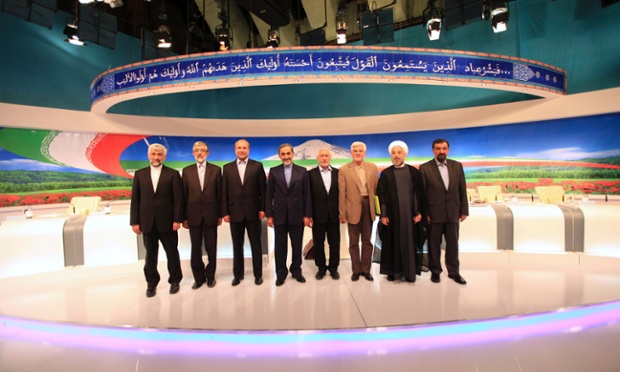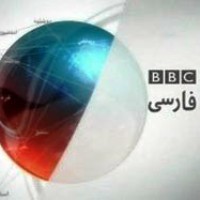Index relies entirely on the support of donors and readers to do its work.
Help us keep amplifying censored voices today.
With the 14 June presidential election approaching, Iran’s leaders are moving to prevent the outburst of protest that followed the disputed 2009 poll by tightening access to the web and silencing “negative” news. Raha Zahedpour reports
 Iran’s state television this week held the second of three presidential debates. Unlike the 2009 debates, no one-on-one debating was allowed. In these debates, resembling game shows, candidates have less than five minutes to talk about their policies on different issues, and other candidates were chosen at random to question the speaker. Candidates were then left with very limited time to conclude after the end of questions.
Iran’s state television this week held the second of three presidential debates. Unlike the 2009 debates, no one-on-one debating was allowed. In these debates, resembling game shows, candidates have less than five minutes to talk about their policies on different issues, and other candidates were chosen at random to question the speaker. Candidates were then left with very limited time to conclude after the end of questions.
The eight qualified candidates could not escape Iran’s strict censorship during their campaigns. Iranian state TV censored reformist candidate Mohammad Reza Aref’s speech in a programme broadcast for the Iranian diaspora on 26 May. The recording was halted and not resumed.
In another programme on the domestic Channel One, conservative candidate Mohsen Rezaei was censored for talking about how unemployment devastated a family who lost their children in the war, and were led to suicidal thoughts as a result of pressures from the economic crisis and inflation.
State television censored documentaries made by the campaigns of each candidate — including Saeed Jalili, Ayatollah Khamenei’s favoured candidate — showing that even a favourite could not escape the sharp blades of censorship.
Iran carefully vetted the candidates in this year’s race: Hashemi Rafsanjani and Rahim Mashaei were disqualified from the upcoming presidential election by Iran’s Guardian Council. Hashemi Rafsanjani, 78, was dropped from the race for being too old. Mashaei was disqualified because he promotes nationalism and nationalist Islam — despite being a part of hard-liners faction.
Even before the election’s candidates were announced, Iran’s ruling elite moved to slow internet connections, blocked access to Gmail accounts, and clamped down on circumvention tools. All over the country, Iranians are struggling to access social media, or even check their email.
Authorities have also tightened up web censorship — censoring even influential political figures close to the government. A blog belonging to one of Rafsanji’s advisors was blocked recently. The move raised eyebrows, because Hashemi Rafsanji is key revolutionary figure, a former president, a former head of Parliament and the current chairman of the Expediency Discernment Council of Iran.
Iran also shut down sites aligned to presidential hopeful Efandiar Rahim Mashaei.
Meanwhile, Ahmadi Moghadam, the chief commander of Police, said that the authorities would not allow any distractions around the election. Following the announcement, jailed journalists and bloggers who were released after being imprisoned and sentenced after the 2009 uprising were arrested once more. Former presidential candidates Mir Hossein Mousavi and Mehdi Karroubi are still under house arrest.
Iran’s press has also faced enormous challenges in reporting on the election. The ministry of Culture and Islamic Guidance invited journalists to a seminar about what could be reported. Officials emphasised that “negative news” should not be published. Subsequently, some papers received official notices for their content. The websites of reformist newspapers Mardom Saalaary and Bahar were blocked, even though print editions of the newspapers continued to be distributed
In light of restrictions, rights organisations have cast doubt on the election’s freedom. In a 24 May statement Human Rights Watch asked, “How can Iran hold free elections when opposition leaders are behind bars and people can’t speak freely?”
Raha Zahedpour is a journalist and researcher living in London. She writes under a pseudonym
Once the Islamic republic’s biggest cultural event, the Tehran International Book Fair – now in its 26th year — has wilted under President Mahmood Ahmadinejad’s hardline government. Raha Zahedpour reports on the recession in Iran’s publishing industry.
 Staff at the BBC’s Persian Service face satellite jamming, smear campaigns and intimidation, says World Service Director Peter Horrocks
Staff at the BBC’s Persian Service face satellite jamming, smear campaigns and intimidation, says World Service Director Peter Horrocks
(more…)
At least 17 prisoners of conscience are on hunger strike in Oman. They began the strike on 9 February at Muscat’s Samayel prison, and other detainees have since joined them, making the total number of hunger strikers 23. Six who were reported to be in a critical condition were taken to hospitals around the capital on 13 February. Yaqoob Al-Harith, a lawyer to seven of the original 17 refusing to eat said they are protesting against the time it is taking to transfer their cases to the supreme court to appeal their jail sentences. The have all been imprisoned for between six and 18 months. The free speech defenders, political activists and civil society representatives were jailed under charges of cyber crimes, illegal assembly, violating communications regulations and insulting ruler Sultan Qaboos on online social networks. Relatives of those imprisoned wrote to the National Human Rights Commission on 10 February and have appealed to the Omani authorities to have the detained released.

Iranian opposition candidate Mirhossein Mousavi has been under house arrest for two years
Two daughters of a former presidential candidate held under house arrest for nearly two years have been arrested in Iran. Zahra and Narges Mousavi, daughters of Mirhossein Mousavi, Iranian prime minister in the 1980s, were arrested by security forces on February 11. Along with Mousavi’s third daughter, they had written in a statement that authorities had denied Mousavi and his wife Zahra Rahnavard access to their children for weeks. Mousavi and Rahnavard were placed under house arrest along with opposition figure Mehdi Karroubi and his wife Fatemeh, after they called for demonstrations to support the Arab uprisings across the region in February 2011. The Islamic Republic is facing a presidential vote in June, and hardliners have accused opposition leaders of plotting a second sedition after the last protests were crushed by security forces. They have also called for the execution of both men, but the government are choosing to keep them in solitary confinement.
Saudia Arabia’s minister for media and culture has confirmed that a range of government bodies have been censoring Twitter, reports on 13 February said. Abdel Aziz Khoga called on Saudi citizens to ”raise their awareness” and monitor their social media activity more carefully, as it was proving increasingly difficult to monitor the three million Twitter subscribers around the kingdom. Under the Sunni monarchy, writer Turki Al-Hamad is one of many journalists in prison under blasphemy charges. He was arrested for insulting Islam in January, after he accused radical Islamists of corrupting Prophet Mohammad’s “message of love” in a Tweet in December 2o12. Online activist Raif Badawi was arrested in June 2012 and was charged with apostasy for his tweet, a sentence which carries the death penalty.
On 14 February, two Nigerian journalists appeared in court for criticising the government’s polio campaign. Yakubu Fagge and Mubarak Sani were charged with criminal conspiracy, abetment, defamation of character, obstruction of a public officer carrying out his duty, intentional insult, and incitement to violence. They plead guilty before judge Ibrahim Bello during their appearance before a senior magistrate court in Gyadi Gyadi, Kano. The pair were arrested after hosting a radio show on Wazobia FM on 6 February, where they alleged the government had forced parents to immunise their children against polio, claiming officials were abusing their power. Fagge and Sani have been granted bail with two sureties each at NGN 100, 000, on the condition the surities are community leaders or heads of department of government organisations. The case was adjourned until 13 March.